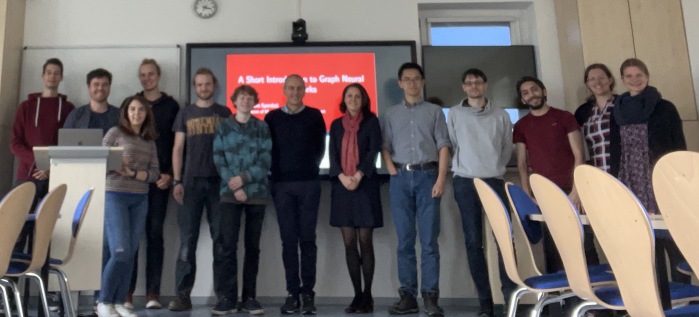News
Kickoff Meeting of DFG project WSAM
The DFG project WSAM (Wide Synthetic Aperture Sampling
for Motion Classification) officially started in a kickoff meeting at DLR Oberpfaffenhofen in Munich. Already looking forward to a fruitful project together with our cooperating partners from Linz University and DLR:
Interview Saxon Academy of Sciences
Take a closer look at Sanaz's Portrait at SAW:
Jugend Forscht 2023
It was a great pleasure to be part of the Bundesjury for Jugend Forscht (https://www.jugend-forscht.de/) 2023, which took place from May 18 to 21 in Bremen.
Spending time with very intelligent young students and discussing their ideas was really great! The motto "Mach Ideen Groß" is the foundation for anything we do in science.
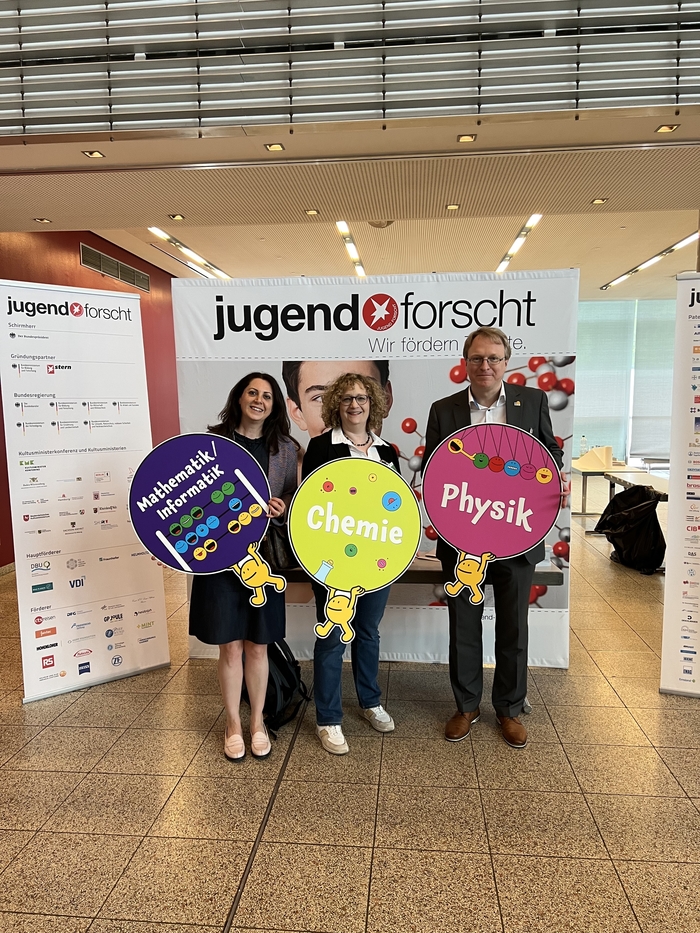
BR Podcast on Swarm Intelligence
Happy to be part of a podcast on Swarm Intelligence:
https://www.br.de/mediathek/podcast/radiowissen/schwarmintelligenz-was-kann-das-kollektiv/1979313
Interview about AI and Diversity
How much is AI influenced by the programmers? Given the fact that we have about 10 to 25% women in computer science, is this influencing AI? The answer to this question, was part of an interview, which Sanaz gave to SRF:
Women in Computational Intelligence
Always happy to support women in Computational Intelligence and computer science. This is a picture of the female members of the chair (Charitha and Kanwal are not on the picture).
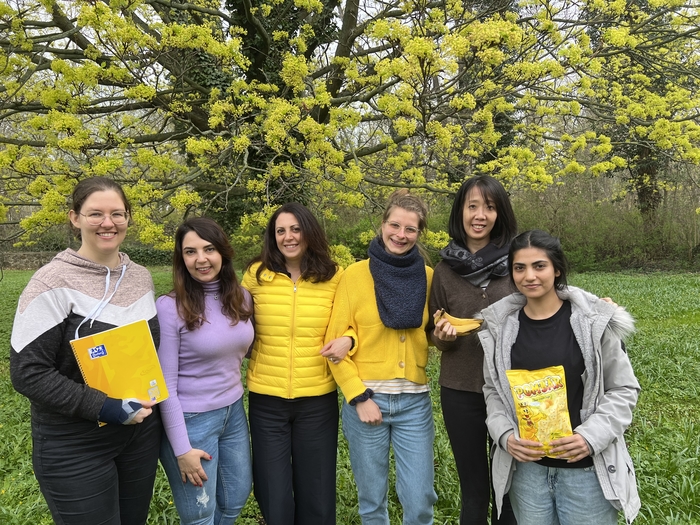
Talk at the law department at the University of Hanover on decision-making
Sanaz gave a talk at the faculty of law of the university of Hanover, about one of our major research topics on decision-making algorithms and the role of the human decision-maker.
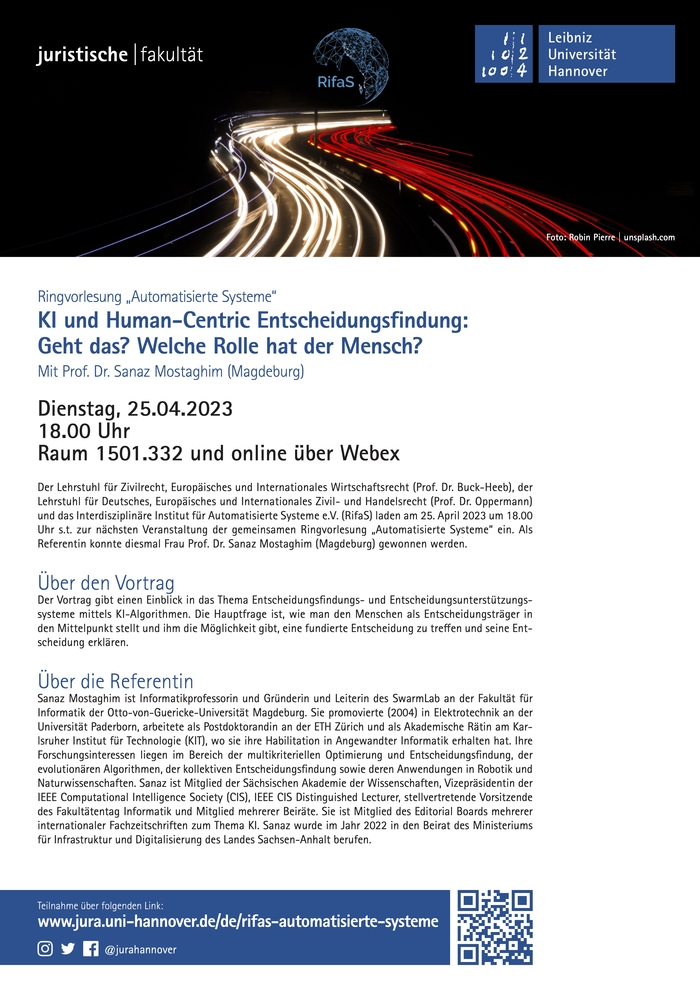
Research Retreat 2023
Our research retreat took place from 17 to 18 April in Thale.
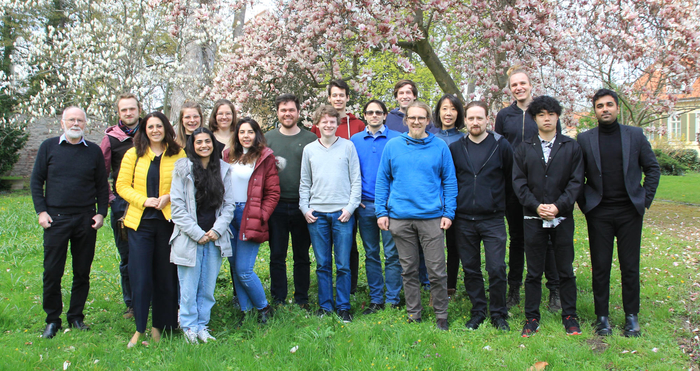
Best Paper Award at EvoStar 2023
Our paper
- Julia Reuter, Hani Elmestikawy, Sanaz Mostaghim, Fabien Evrard and Berend van Wachem
- Graph Networks as Inductive Bias for Genetic Programming: Symbolic Models for Particle-Laden Flows
- In: Pappa, G., Giacobini, M., Vasicek, Z. (eds) Genetic Programming. EuroGP 2023. Lecture Notes in Computer Science, vol 13986. Springer, Cham. https://doi.org/10.1007/978-3-031-29573-7_3
received the best paper award at the EuroGP conference, which took place in Brno, Czech Republic
, 12-14 April 2023.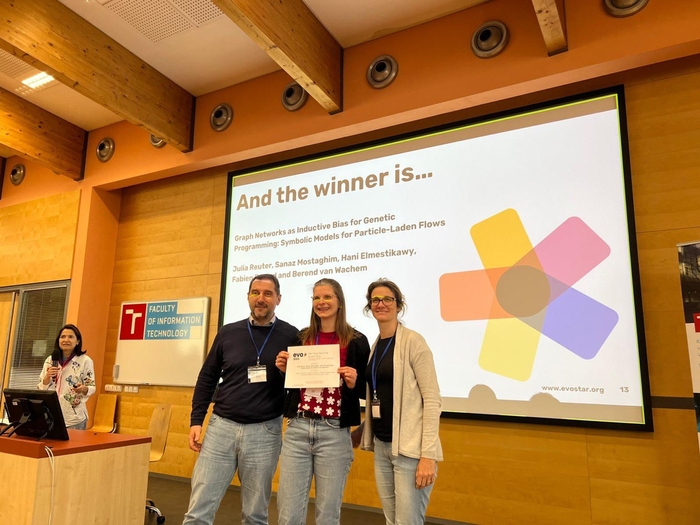
Tobias also received the best student poster award at the same conference:
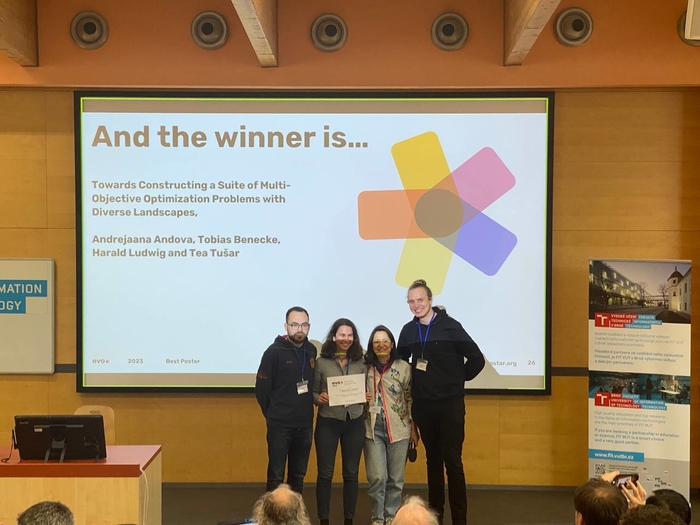
Simon's PhD Defense
Simon Anderer successfully defended his PhD with the title:
Role Mining for Industrial-strength ERP Systems Using Evolutionary Algorithms
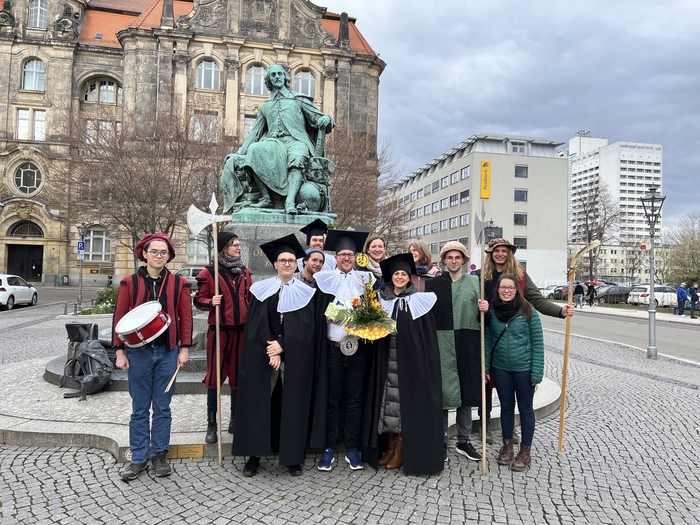
New DFG Project
A new DFG project which is jointly financed by the Austrian Science Fund (FWF) has been approved. We will collaborate with the Johannes Kepler University in Linz and the German Aerospace Center (DLR) in Oberpfaffenhofen. The goal of the project is the use of autonomous drone swarms for rescue applications.
Here, drones can imitate the swarming behavior of birds to always have an optimal view for rescue purposes.Considering the current high level of attention that is being paid to drones, it is easy to overlook the enormous potential that they bring with them in civilian areas. Drone groups are establishing themselves worldwide in blue light organizations such as the police, fire brigade and mountain rescue to use this technology to save human lives. Search and rescue operations benefit, among other things, from the flexible, fast and - compared to helicopters - inexpensive and safe use of drones. They are also used in the inspection of disaster areas, for the early detection of forest fires, for border security, or wildlife observation. The problem with all these applications is always the occlusion caused by vegetation, such as forest, which usually makes it impossible to find, detect, and track people, animals or vehicles in single aerial photographs. This project is based on the "Airborne Optical Sectioning" (AOS) imaging method developed at the Johannes Kepler University and will study further potentials of the swarms.
PhD Defense Jens Weise
On 6th February, Jens Weise successfully defended his PhD with the title "Evolutionary Many-Objective Optimisation for Pathfinding Problems":
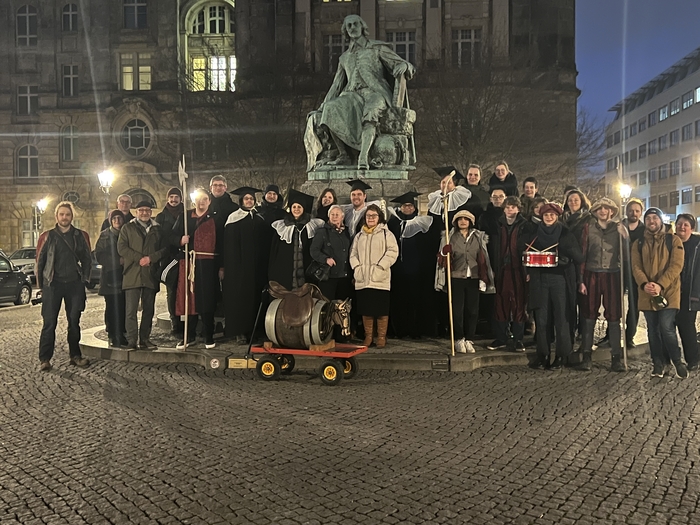
Keynote talk of Prof. Deb
On Monday 6th February, Prof. Kalyanmoy Deb from Michigan State University gave a University Guest lecture with the Title "Evolutionary Multi-Criterion Optimization: An Emerging Computational Problem-Solving Tool". Over 100 participants attended the talk.
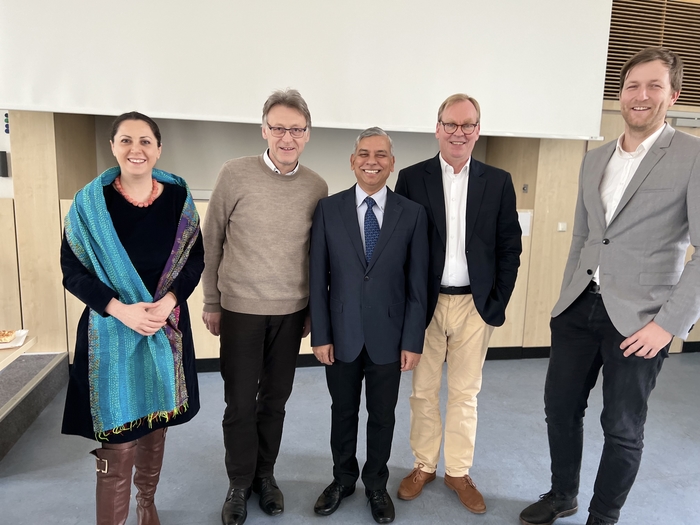
Picture Left to right: Prof. Sanaz Mostaghim, Prof. Jens Strackeljan (President of the University), Prof. Kalyanmoy Deb, Prof. Hans-Knud Arndt (Dean of the Faculty of Computer Science), Prof. Pascal Kerschke (TU Dresden).
Abstract: Most problems in science, engineering and commerce involve more than one conflicting criteria to be simultaneously optimized. Despite the vast literature on scalarizing multiple criteria into one, evolutionary optimization methods of treating them as truly multi-criterion problems in a Pareto sense produce a number of additional benefits to the users. Their ability to find and maintain multiple trade-off solutions with a flexible and customizable framework provides vital knowledge about the problem in addition to the optimal solutions themselves. In this lecture, we shall present a few popular and state-of-the-art algorithms, demonstrate their advantages on a number of real-world practical problems from engineering and society, and introduce some recent research topics. Additionally, the use of machine learning algorithms and human knowledge in enhancing their performance, and the use of multi-criterion algorithms in enhancing performance of machine learning methods will be discussed.
Bio-sketch: Kalyanmoy Deb is University Distinguished Professor and Koenig Endowed Chair Professor at Department of Electrical and Computer Engineering in Michigan State University, USA. Prof. Deb's research interests are in evolutionary optimization and their application in multi-criterion optimization, modeling, and machine learning. He is and has been a visiting professor at various universities across the world including University of Skövde in Sweden, Aalto University in Finland, Nanyang Technological University in Singapore, and IITs in India. He was awarded IEEE Evolutionary Computation Pioneer Award for his sustained work in multi-objective optimization, Infosys Prize, TWAS Prize in Engineering Sciences, CajAstur Mamdani Prize, Distinguished Alumni Award from IIT Kharagpur, Edgeworth-Pareto award, Bhatnagar Prize in Engineering Sciences, and Bessel Research award from Germany. He is fellow of ACM, IEEE, and ASME. He has published over 600 research papers with Google Scholar citation of almost 180,000 with h-index 129. More information about his research contribution can be found from https://www.coin-lab.org.
Prof. Kruse as a Jury of BBVA Award
Prof. Kruse was part of the Jury for the prestigious BBVA Award: https://www.frontiersofknowledgeawards-fbbva.es/noticias/15th-edition-information-communication-technologies-alberto-sangiovanni-vincentelli/
Xenija's PhD
Xenija Neufeld had successfully defended her PhD in December 2020. Due to COVID we could not give her PhD hat, which we finally did 2 years later :-)
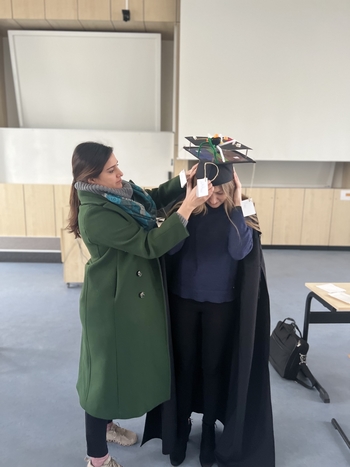
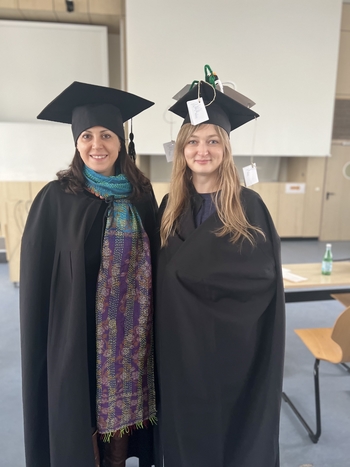
SDW visits SwarmLab
On 17th January, the students and the trusties (VertrauendozentInnen
) of the SDW (Stiftung der Deutschen Wirtschaft) visited SwarmLab. Sanaz is acting as a trusty (Vertrauendozentin) of SDW since 2018.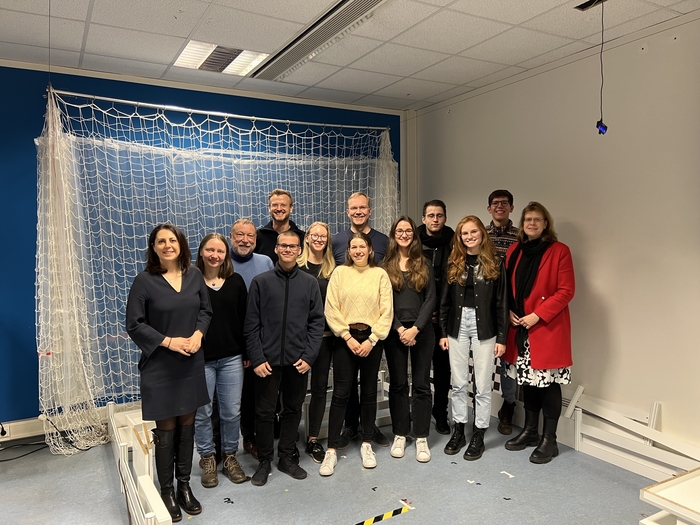
Hall of Femmes
Delighted to be part of the "Hall of Femmes" at the Paderborn University:
https://upb50.de/hall-of-femmes/
New Project AULA-KI
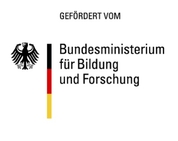 |
AULA-KI: Adaptive Umgebungsabhängige Lokalisierung von autonomen Fahrzeugen durch Methoden der künstlichen Intelligenz. |
On first of October, the project associated with our AI young scientist group founded by the BMBF started.
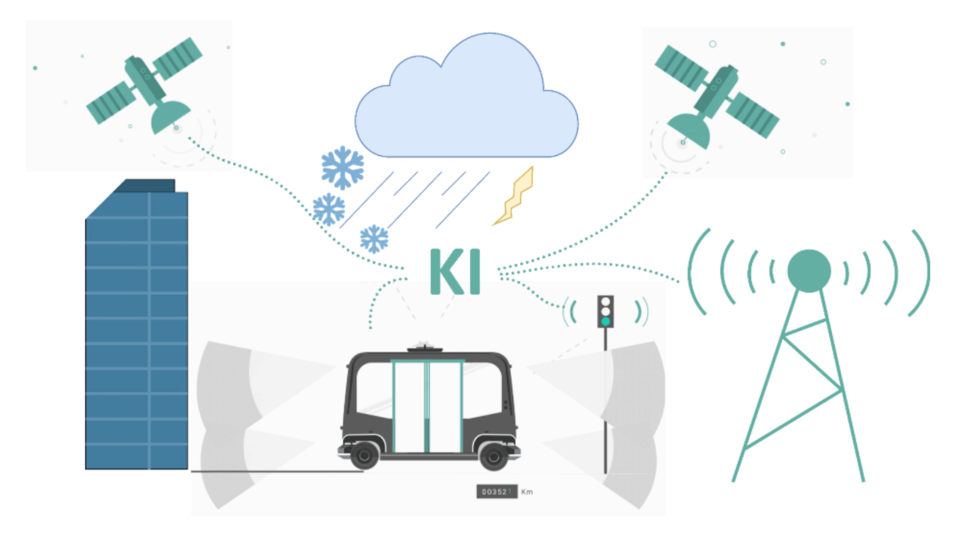
Sanaz as a member of DigitalRat
Sanaz has been appointed as a member of the Digitalization advisory board "DigitalRat" of the state of Saxony-Anhalt: https://t.co/ZvLX7ggUashttps://t.co/32dpwR2y5z
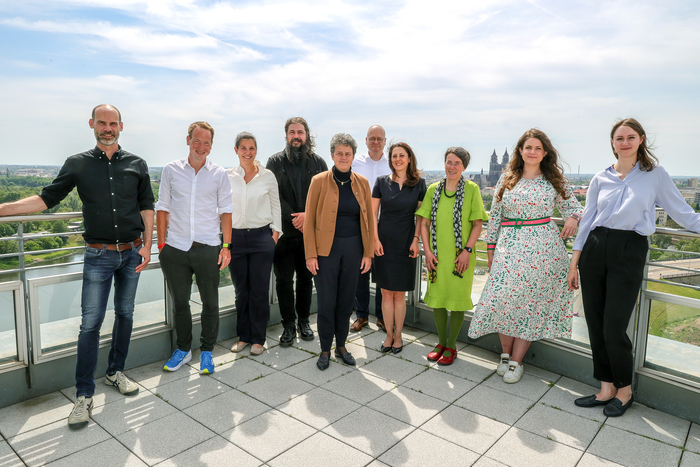
MID/Foto: Viktoria Kühne
Guest Lecture
Finally the first in person lecture took place at our chair. Professor Sperduti (Padova University, Italy) gave a talk on "An Introduction to Graph Neural Networks".
